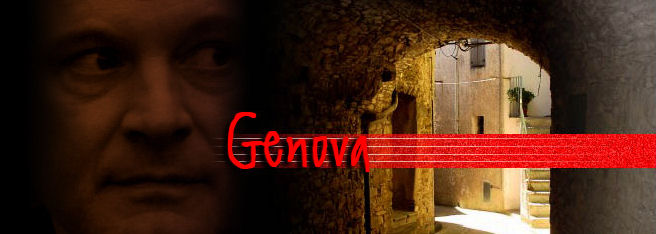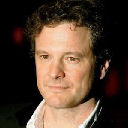 |
 |
 |
|
 |
|
 |
|
 |
|
 |
|
 |
|
 |


 |
 |
 |
 |
 |
| Colin Firth Joe |
Catherine Keener Barbara |
Hope Davis Marianne |
Willa Holland Kelly |
Perla Haney-Jardine Mary |

 |
||||
| Production Stills (7/24/08) |

(Film4 feature by Holly Grigg-Spall)
The acclaimed British director Michael Winterbottom made his latest feature in the Italian port city of Genova. In his trademark intimate, naturalistic style, he's created a portrait of a family's struggle to overcome their grief. Father Joe, played by Colin Firth, takes his daughters Kelly (Willa Holland) and Mary (Perla Haney-Jardine) to Genova in the aftermath of a car accident in which their mother died. As they settle in to a new way of life for the summer, we follow the individual journeys they take that will eventually bring them closer together.
When you first considered making Genova, what came first—the location, or the story?
Before I began working on the script I was in Italy and saw Genova so in a way that came first. Then I went back a couple of times while I was working on the story.
What was it about the city that appealed to you for this film?
Genova is a big modern city, with a big industrial centre and ports. So it has a lot of energy. It also has a large medieval old town that's very crowded. There's this maze, like a labyrinth, of alleyways and it feels like its not been changed much over centuries. When I was there I was considering that there might be a film we could make.
Did you feel the city reflects on the emotional journey of the family?
The characters in the film are emotionally lost. They're on their way to starting a new life and struggling to come to terms with what has happened to them. As they wander around the alleyways of the old town, the maze is a physical version of what's going on mentally and emotionally for them.
Was it a challenging city to work in?
As you'd imagine it would be enjoyable to make a film in Italy and it was. We were a very small crew so we weren't trying to control the whole of Genova. It was a bit of a summer holiday really—a summer holiday making a film.
You usually work with a small crew to keep the pared down feel of your films. Did you work similarly on Genova? And do you find new, smaller camera technology advantageous to creating this feel?
We had a technical crew of half a dozen people who would be on set, then maybe 20 people in total working on the film. For me it's more enjoyable to make a film as simply as possible. Different stories require different methods, but if I can treat a story simply then I will. It's a choice you make about how you want to work.
I like the idea of taking actors into real situations and letting that real situation continue—having fictional characters in a place with real life going on all around them. To get that you need to use a small crew. You can't take tons of people into a place and expect everyone to carry on as if you're not there.
I started learning about filmmaking from watching old films like Breathless. In 1960 the camera was probably huge, but you feel there's a sense of people going out and having fun, going out and enjoying making a film. They filmed the actors walking down the street but there are people passing by, looking into the camera, who are clearly passers-by. There's a sense of freedom and of ease.
How did you help the young actress Perla Haney-Jardine understand the emotions of grief and guilt you needed her to show?
Everyone's different so you have to try and work with the individual. None of the actors were first timers. Perla was probably more relaxed and more happy with improvisation than Willa—she'd get the idea of a scene and go with it. There's no good or bad way to do it, it's just what people choose. Some people like a framework and some people like to have more space.
Did the cast spend much time in Genova in preparation before the shoot started?
The film is set in the month they arrive, before they start this new life. It's a limbo time for them between America and Italy. We didn't need a lot of preparation—in a way it would have been the wrong thing to do, as we wanted to catch them as strangers in this place. They were supposed to be fish out of water, not knowing Italian and not knowing Genova, and they were like that anyway. We tried to film it in sequence so the people would get to know each other and gradually get a bit more relaxed as time went on.
When you were filming in the busy bars and on the crowded beach, how did you work with the people?
Normally we'd just put the cast in a real bar. But this time sometimes we would let people know we were going to be there, that we'd be filming. It was a slightly more controlled version of what we'd do normally. We weren't surprising them. On the beach in the daytime we rented just the four seats we used. There were around 10,000 people on the beach that day so we couldn't possibly control that.
When the film comes to an end, it seems as though it could have gone on. How did you choose to stop there?
We weren't sure from the start how it should end. All the way through you have anxiety for the family, that something might happen to Mary in particular, but also to Kelly or Joe. You wonder if Joe will be punished for not looking after his children properly. Or if Kelly will be punished for getting into drugs and sex. You worry for Mary as she feels guilty about her mother's death. But something has to happen to end the story. We thought they should find some way of getting over the death of the mum. I think the narrative of anxiety keeps you watching, and then there's relief.
How did you come to choose Colin Firth for the role of the father?
Colin is an idealized version of an Englishman. I liked the idea that the father would be English and the children American, so there'd already be a displacement for him - he'd already have left home in his life. When his wife dies, it's natural he wants to leave America as that place is solely for him where he lived with his wife.
The film's about home in the broader sense. They're isolated in this new country, away from friends, from what they know, and that could hide the family connections. But in the first month they're more around each other than ever before.
Colin seemed to make a good academic, a good dad. He's old enough to be their dad but could have a romantic past, or a new romance. And he's incredibly likeable. I wanted all the characters to be likeable. I wanted you to like them and want them to survive somehow.
And what is the next film?
Michael Winterbottom: We’ve just been filming in Italy, so it’s set in Genoa and Colin Firth is playing a British guy who has been living in America for 20 years. He’s got two daughters, who are 12 and 15, but they’ve been in a car crash with their mother and she has died. It starts just after that, as they leave America and go to Genoa for a year, where he will lecture in university. But they’re sort of in limbo—they’ve left America and their friends and they’re waiting to start their new life in Italy—it’s August and everyone is on holiday, so they have a month before they start just to hang out in the summer. Basically, it’s about three people in limbo before they start their new life.
(Guardian, Sept 14, 2007, by Andrew Pulver)
"We
made a conscious effort to keep things as simple as
possible," he says. Winterbottom is sitting around waiting to begin a
night shoot in
Firth, who himself is fitting his work on Winterbottom's film around shooting scenes on a much bigger-budget number, the adaptation of the Abba musical Mamma Mia!, is unabashed in his appreciation. "He makes it seem like the most obvious way to work of all," he says later. "I appreciate that it is a very tiny unit, and it means everyone is at the heart of the process. You're in touch with the decisions and what's going on. You're part of it in a way that in conventional films is just not the case. For very obvious reasons, there are obstacles in 'normal' film-making: you spend hours waiting for the lighting and the rigging and the setting-up; then you're brought in to make your contribution in very minute pieces and out of sequence. Most actors will tell you on a film like that you're struggling to be where you should be. The waiting has the effect of sapping the energy. It drains you."
As the man at the sharp end of things on Genova, Firth talks through Winterbottom's on-set techniques. Rehearsal is pretty much dispensed with, says Firth—admittedly not especially uncommon in cinema, where freshness is all—but Winterbottom never does a second take of the same shot; when they go through a scene a second time, he always shifts the camera's position. The camera, he says, is also turning over from virtually the second they arrive in any given location. "He doesn't say 'action'; he doesn't say 'cut'; he'll just catch your eye and give you an indication that they are rolling." Nor, it transpires, is there a continuity person around to keep track of what's happening, which means matching shots in the conventional matter is virtually impossible. Hence the apparently casual, semi-random editing style Winterbottom has developed; as much a question of necessity than any aesthetic affectation.
Genova lacks the
· Genova will be released next year
(EDGE Boston, Jun 19, 2007, by Kilian Melloy)
EDGE: What are you working on as your next project? Will you return to this genre of drama based on true events, or will you do something more light-hearted, as you did with Tristram Shandy, or will you look to do something in a different genre?
Michael Winterbottom: What we’re doing right now is a film in Italy called Genova. It’s a story about a British guy who’s been living in America for twenty years, and his two daughters who are Americans, because they were born here. They go over to Genova for a year. [The film] just takes place in August; they sort of arrive in the heat of August, and the place is empty because everybody is on holiday. It’s a month in limbo before they start their new life in Italy. We’re about to start filming [that] in two or three weeks’ time.
(5/18/07: indieWIRE, May 18, 2007, by Peter Knegt)
Michael Winterbottom's follow-up to "A Mighty Heart," Film 4 backed "Genova," has confirmed Colin Firth, Hope Davis, and Catherine Keener as its stars. Relative newcomers Willa Holland ("The O.C.") and Perla Haney-Jardine ("Spiderman 3") will co-star. "I am very excited about working with such wonderful actors in such a beautiful city," said Winterbottom. "It is a story I have been working on for a while." Shooting is slated to begin at the end of June on location in Genova, Italy, as well as in Boston, Massachusetts.
(Variety, May 18, 2007, by Adam Dawtrey in Cannes)
Catherine Keener and Hope Davis have joined the previously announced Colin Firth in the cast of Michael Winterbottom's next movie, "Genova."
Pic, an emotional ghost story, is financed by Film4, the U.K. Film Council and Aramid Ent. It will also star newcomers Willa Holland and Perla Haney-Jardine. Shooting starts in June, on location in Genova, Italy, and Boston. Dreamachine is handling sales.
(indieWIRE, Apr 3, 2007, by Eugene Hernandez)
The compay also announced that it has concluded multiple international pre-sales on...Michael Winterbottom's "Genova" with Colin Firth, Katherine Keener and Hope Davis..."
(Screendaily, Mar 16, 2007)
"To be honest, it hasn't been too bad for us (with Michael Winterbottom's Genova)," says producer Andrew Eaton, co-founder of Revolution Films. "We don't shoot until the summer and so we have had quite a lot of time on our side. I think we've got the finance back in place. The ones that are financially viable will find other funds. We got a lot of offers from other funds and quite a lot of offers from equity funds in America."
Funding for New Firth Film Hit by Tax Clampdown
(Screendaily, Mar 8, 2007)
Actor Colin Firth's new film GENOVA has lost GBP500,000 ($975,000) in funding after a tax clampdown by the British government forced investors to pull out. The Michael Winterbottom film GENOVA is the second major casualty of the new restrictions introduced by the Labour government last week (02MAR07) - which mean movie investors are no longer able to offset losses against tax. The British Treasury yesterday (08MAR07) stated they would allow films close to finishing development to continue as planned. However, projects not already in production after 1 January (07) were subject to the clampdown, resulting in the withdrawal of large investments from individuals and private companies. But Genova producer Andrew Eaton is confident he will be able to recover some funding from other sources. He says, "We were lucky in that filming wasn't due to begin until July so we do have time to plug the funding gap."
Ghost story 'Genova' set to shoot next spring
(Variety, Nov 1, 2006, by Adam Dawtrey)
Colin Firth will star in Michael Winterbottom's contemporary ghost story "Genova," set to shoot next spring.
Firth plays a recently widowed man who travels to Italy with his teenage daughters in search of a fresh start, but cannot escape the ghosts of his past.
(Screendaily, Nov 1, 2006, by Wendy Mitchell)
HanWay Films has acquired worldwide rights outside the UK for Michael Winterbottom's forthcoming Genova, which now has Colin Firth attached to star.
Winterbottom and Andrew Eaton's London-based production company Revolution Films is producing with co-financing from Film4 (which holds UK rights). Winterbottom will shoot the project in spring 2007 on location in Italy with post-production will follow in the UK....
The script is written by Winterbottom and Laurence Coriat, his collaborator on A Mighty Heart and 1999's Wonderland. The story follows Joe (Firth) and his two young daughters who move to the eponymous Italian town to get a fresh start following the sudden death of their wife and mother. The elder sister explores the city's underbelly while her younger sister claims to see her mother's ghost. Casting hasn't yet been announced for the two girls.
It's the first time the London-based sales company has worked with Winterbottom, whose previous films have frequently been sold by The Works. "We've always wanted to work with Michael Winterbottom and Andrew Eaton and we are thrilled to be involved with such a heart-warming, cosmopolitan story," said HanWay CEO Tim Haslam. "We're confident it's one which will resonate with film-lovers around the world."
Please do
not upload
any images to
your own website, club, group or community's photo album. Thank you. |
Click on boots to contact me  |